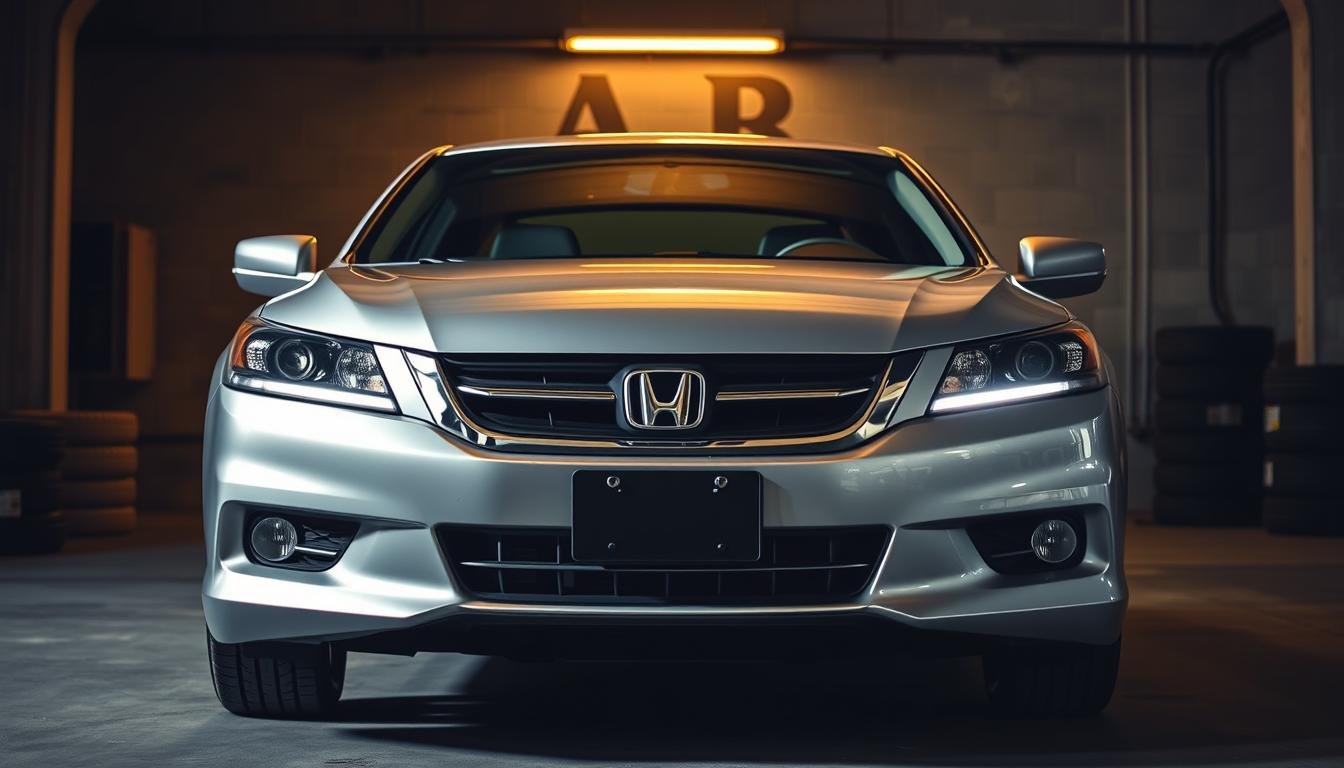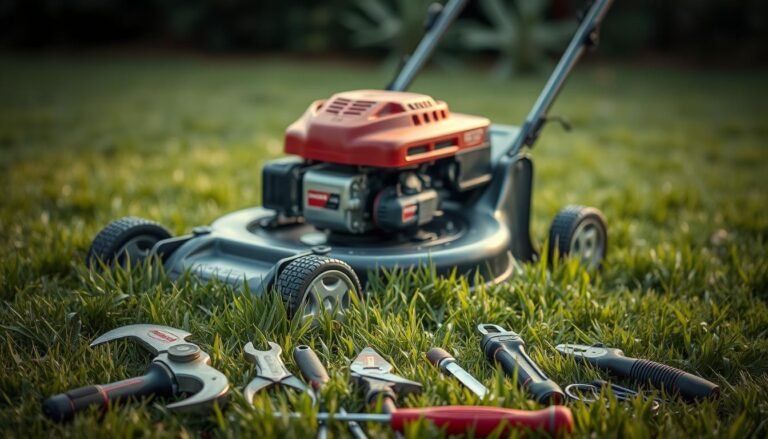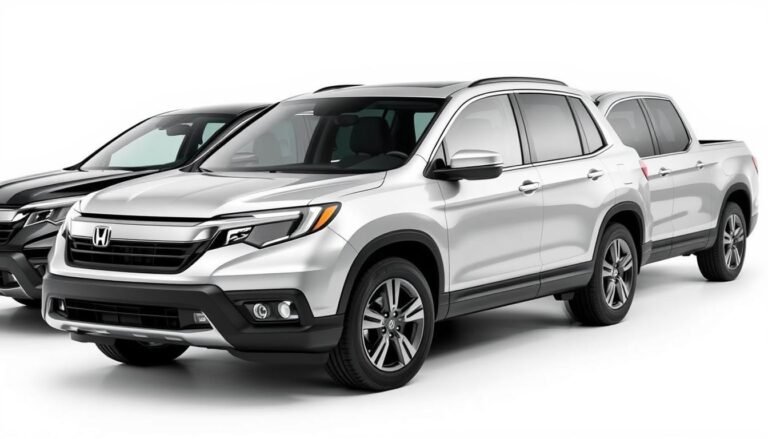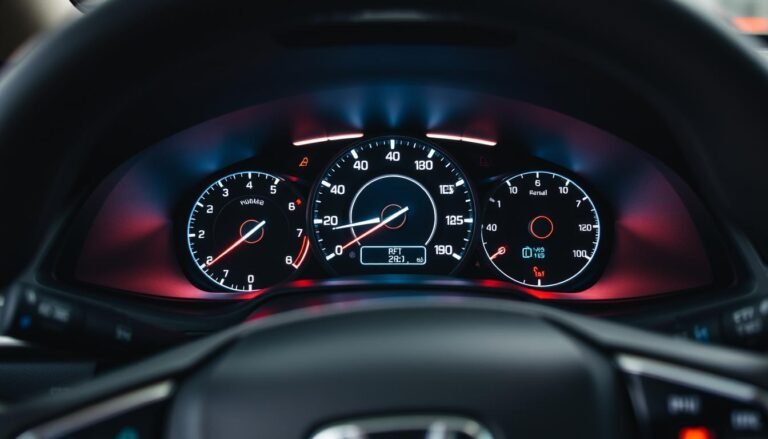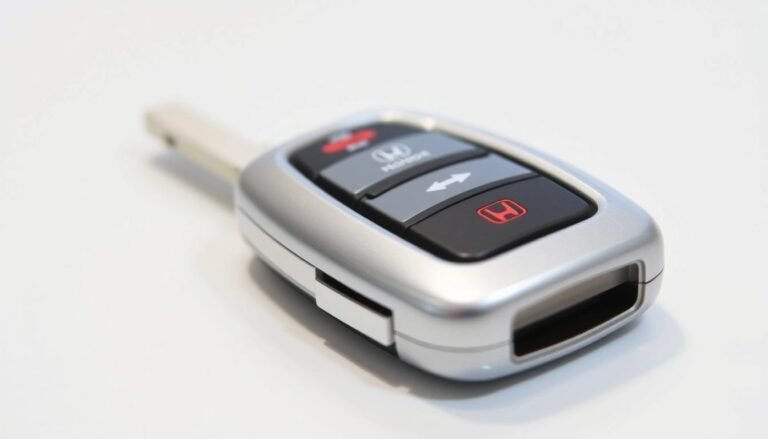Honda Accord Years To Avoid – Insider Tips
The Honda Accord is well-known for being reliable and lasting a long time. However, some years should be avoided because of often-reported issues.
We’ll look at which Honda Accord years have reliability problems. We’ll also share tips on navigating the used car market.
We’ll point out the main years when the Honda Accord had issues. We’ll talk about the problems to watch out for.
Knowing this, you can avoid buying a car that might not be reliable. If you want to find out the Honda Accord years to steer clear of and pick a reliable model, keep reading.
We’re about to share everything you need to know for a dependable drive.
What is The Honda Accord Reputation For Reliability?
The Honda Accord is known for its strong reliability. It often gets top marks in reliability scores. This shows Honda’s focus on top-notch engineering.
If you take good care of the Honda Accord, it may easily go over 200,000 miles. That’s why so many people love it.
A look into the Honda Accord’s past shows how it’s improved over time. Thanks to better manufacturing and a focus on lasting quality, people trust the Accord.
They like how well it performs, how long it lasts, and the good things owners and mechanics say about it.
Learning about its history and quality shows why some models are extra reliable and perform well.
Key Years with Honda Accord Reliability Concerns
The Honda Accord is known for being reliable. But some years have had issues that buyers need to know.
These troublesome years range from 1998 to 2005, dealing with transmission and engine troubles that disappoint drivers.
The years 2008 to 2010 also brought problems. People owning these Accords faced excessive oil use and early brake wear.
This led to a lot of complaints from Honda Accord owners. It’s key to know these years so you can make a smart choice when buying a used Honda Accord.

| Model Year | Common Issues | Owner Feedback |
|---|---|---|
| 1998-2005 | Transmission failure, engine problems | Frequent complaints about shifting issues |
| 2008-2010 | Excessive oil consumption, brake wear | Many reports of high repair costs |
Getting to know these specific years can help you dodge Honda Accord reliability issues. It lets you choose a car wisely.
Honda Accord Years To Avoid – Insider Tips
Before you buy a Honda Accord, know which years were troublesome. Some models have major reliability issues, making them bad choices. Knowing these problems helps make a smart choice.
Overview of Problematic Models
Many Honda Accord models are known for their problems. Avoiding these years can prevent future headaches.
Problematic years are:
- 1998-2002: Transmission failures and engine problems are prevalent.
- 2008-2010: These years are known for excessive oil consumption and electrical system failures.
- 2013: Unresolved issues with the infotainment system have caused user dissatisfaction.
Factors Contributing to Issues
It’s vital to know why these models had issues. Manufacturing defects and quality control lapses were big reasons. Problems usually occur in certain production batches.
This affects vehicle reliability. Modern engines and electrical systems’ complexity often lead to more complaints from owners.
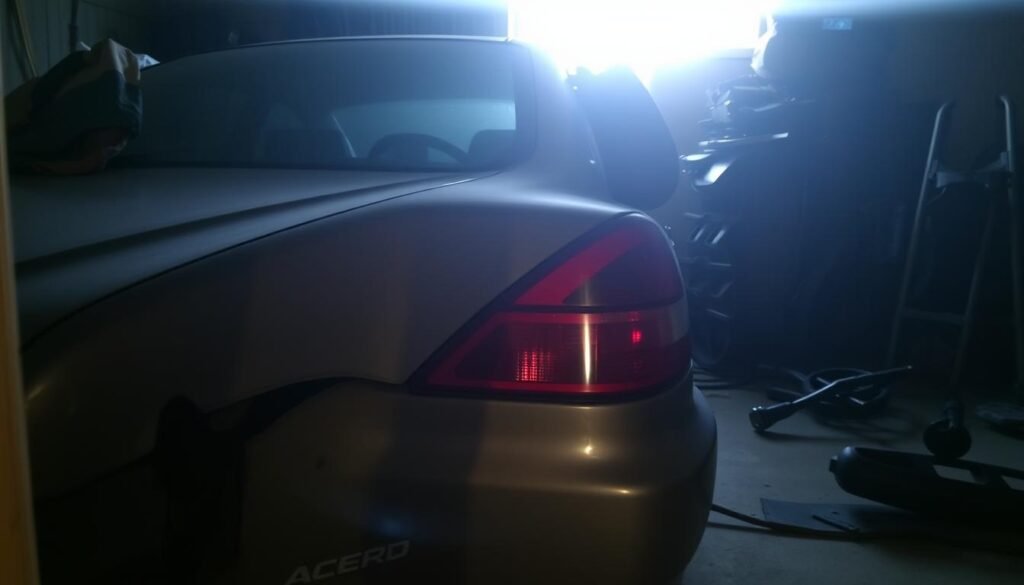
| Model Year | Common Issues | Reasons for Avoidance |
|---|---|---|
| 1998-2002 | Transmission failures, engine problems | Frequent repairs, high failure rates |
| 2008-2010 | Excessive oil consumption, electrical failures | Increased maintenance costs, reliability concerns |
| 2013 | Infotainment system issues | Poor user experience, potential recalls |
Transmission Troubles: The 1998-2005 Model Years
The 1998 to 2005 era marks an important time for Honda Accord owners due to transmission problems.
Many reported various symptoms suggesting serious transmission issues during this period. It’s crucial for buyers considering these vehicles to know these common signs.
Common Symptoms of Transmission Failure
Between 1998 and 2005, many drivers noticed symptoms signaling transmission failures:
- Slipping gears, often leading to unexpected speed changes.
- Thudding sounds during shifts, hinting at internal problems.
- Complete transmission failures while driving, creating risky situations.
- Slow response moving from park to drive or reverse.
- Fluid leaks under the car, pointing to a bad seal.
Transmission Recalls and Owner Experiences
In the mentioned Honda Accord years, recalls tried to fix transmission issues. Yet, many owners remained unhappy with these solutions.
They shared stories of transmission failures happening right after the warranty ended. This fact worries potential buyers looking at 1998-2005 Honda Accords.
| Symptoms | Possible Causes | Owner Feedback |
|---|---|---|
| Slipping gears | Worn transmission clutch | Often reported, leads to safety concerns |
| Thudding noises | Internal transmission damage | Commonly described as alarming |
| Complete failure | Fluid or part wear | Seen as a big inconvenience post-warranty |
| Delayed engagement | Issues with transmission fluid | Known as a sign of upcoming failure |
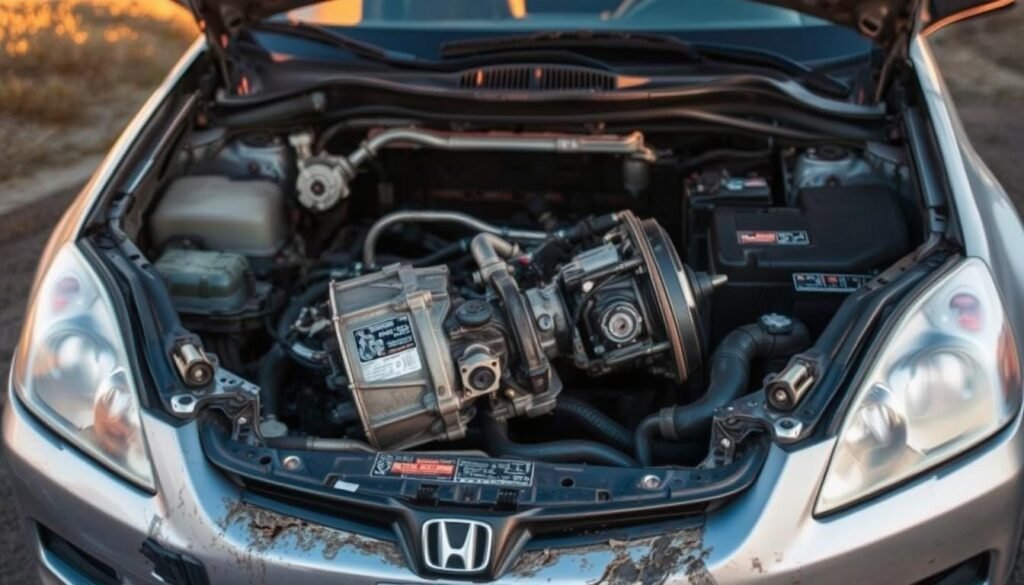
Engines and Electrical Issues: 2008-2010 Models
From 2008 to 2010, Honda Accords have had notable engine and electrical issues. Many owners have faced significant problems with the Honda Accord’s engine during these years.
Issues include using too much oil and other operation troubles. Electrical system failures are also a big concern, making people doubt these models’ dependability.
Excessive Oil Consumption Concerns
A major problem with the 2008-2010 Honda Accord is it uses too much oil. Owners need to refill oil sooner than they should, which can harm the engine over time.
This problem shows up as:
- Needing more oil changes
- Oil warning light coming on
- Engine performance going down
Design flaws are often to blame for this oil issue as the cars get older, leading to many complaints from unhappy owners.
Electrical System Failures and Complaints
Another big problem is with the Honda Accord’s electrical system during these years. Owners have reported annoying issues like:
- The car stalling while driving
- Having trouble starting the car
- Brakes wearing out too soon
These electrical problems are mentioned a lot in feedback from owners. It shows a need for better design in newer models.
Fixing these ongoing issues is very important for those who own these cars and those thinking about buying one.
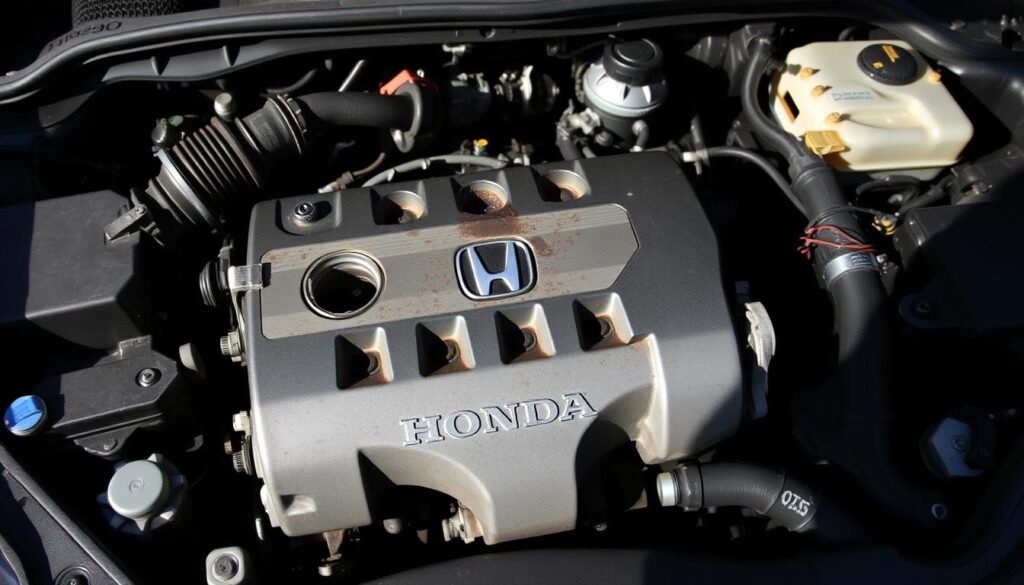
Seventh and Ninth Generations: Years To Be Wary Of
The seventh generation Honda Accord, from 2003 to 2007, faces specific concerns. Potential buyers should know about these.
Issues include transmission reliability and interior quality. The ninth generation, from 2013 to 2017, has its own problems.
These are mainly technical issues that affect driving. It’s important to know about these problems before buying.
Identifying Key Problem Areas
Let’s look at what issues stand out:
- Transmission Failures: Both generations have notable transmission problems. There has been high incidence of slipping gears and shifting delays.
- Poor Interior Build Quality: The seventh generation’s interior quality has been criticized. Materials tend to wear down quickly, making the interior seem less appealing over time.
- Electrical Issues: In the ninth generation, there are various electrical problems. These include malfunctions in the infotainment system and dashboard displays.
- Engine Performance: Both models generally have reliable engines. However, there can be performance issues as the cars get older. This makes it crucial to check the cars thoroughly before buying.
Knowing these problem areas helps you prepare for any repairs and maintenance. This is crucial when looking at the seventh and ninth generation Honda Accords.
Honda Accord Common Issues with Specific Years
The Honda Accord is known for being reliable. However, some model years have specific problems that owners often face.
It’s important to know about these issues, especially in models made from the mid-2000s to the mid-2010s.
These cars sometimes have major issues like uncomfortable seats and problems with the electrical system.
Reported Complaints Across Multiple Generations
A lot of Honda Accord owners have had trouble with the car’s starter and electrical system.
These problems are especially common in cars from certain years:
| Model Year | Common Issues Reported |
|---|---|
| 2003 | Starter problems, electrical failures |
| 2008 | Electrical system failures, excessive oil consumption |
| 2010 | Uncomfortable seating, starter issues |
| 2012 | Electrical malfunctions, other persistent issues |
Long-term Effects of Issue Resolution
Fixing common Honda Accord problems doesn’t always work the same way. Some repairs can permanently solve the issue, but others might not last.
Many owners share that how well the problem is fixed can really affect how they feel about their car.
Knowing about these issues can help you decide which Accord models to skip when looking for a dependable car.
Safe Years For Buying A Used Honda Accord
Thinking about getting a used Honda Accord? It helps to know which years people liked the most. These years had fewer problems, giving you less to worry about.
The best models came out in 2006, 2007, and between 2011-2020. They got great reviews for being reliable and keeping customers happy.
High-Rated Models To Consider
- 2006 Honda Accord: Praised for its fuel efficiency and spacious interior.
- 2007 Honda Accord: Known for its excellent handling and comfort features.
- 2011 Honda Accord: Recognized for robust engine performance and safety ratings.
- 2012-2020 Honda Accord models: Continuously improved features, technology, and safety measures.
What Makes Them Reliable Choices
Why pick these Honda Accord models? They don’t cost much to keep up and people really like them. Honda made sure these cars were built to last.
You’ll get great safety, a smooth ride, and easy handling. Lots of owners agree, making these cars a smart buy.
What To Look For When Buying A Used Honda Accord?
When you’re in the market for a used Honda Accord, pay close attention to certain details. Checking models and their service history is key.
It helps understand the car’s reliability. Make sure you’re well-informed before you decide.
Conducting A Thorough Inspection
Inspecting the car carefully before you buy is crucial. Focus on these parts:
- Transmission Function: Check for smooth shifting and listen for unusual noises during gear changes.
- Oil Levels and Condition: Look for proper oil levels and check for signs of leaks or excessive consumption, particularly in models from specific years.
- Brakes and Suspension: Test the brakes for responsiveness and evaluate the suspension for any irregular noises or issues.
Learning Service History and Recalls
Service history checks are vital. They show how well the car was taken care of. Look for records of oil changes, inspections, and repairs.
Also, make sure any recalls have been fixed. Good service history means you can trust the car’s condition.
Conclusion
Shopping for a used Honda Accord means understanding which years to avoid because of their known issues.
This article has pointed out specific models that might give you trouble with their transmission, engine, or electrical systems.
Knowing this helps you steer clear of cars that could cost a lot in repairs. When looking for a Honda Accord, it’s key to do your homework.
Get to know the common issues and find out which years are safe and reliable. This way, you can make a smart choice.
This knowledge will increase your chances of finding a reliable used car. Always prioritize getting a car checked thoroughly and knowing its service history.
This ensures you’re buying a car that’s not only enjoyable to drive but also dependable.
Remember, buying a car is about trust, not just avoiding the bad models. Keep this guide in mind to make wise choices when picking your Honda Accord.
FAQs
Q: What Honda Accord years should I avoid when buying used?
A: Avoid Honda Accord models from 1998-2005 because of transmission issues. Also, steer clear of the 2008-2010 models due to their oil and electrical problems.
Q: Which specific Honda Accord models are known to be problematic?
A: The sixth generation (1998-2005) Honda Accords often have transmission failures. The 2008-2010 models struggle with oil consumption and electrical system failures.
Q: What are the common problems reported by Honda Accord owners?
A: Honda Accord owners often face transmission slipping and engine stalling. They also deal with high oil consumption, electrical issues, and brakes wearing out too soon. These problems are mainly found in the problematic model years.
Q: How can I tell if a used Honda Accord has been well-maintained?
A: Look at the car’s service history and check for any recall records. Then, inspect the transmission, engine, and other major parts closely.
Q: Are there Honda Accord years that are considered safe and reliable?
A: Yes, the 2006, 2007, and 2011-2020 model years are generally more reliable. They have fewer reports of major issues, making them better buys.
Q: What should I specifically look for during a Honda Accord inspection?
A: Check the transmission, oil levels, and for electrical problems. Make sure the car has been well taken care of.
Q: Were there any recalls for the problematic Honda Accord years?
A: Some 1998-2005 models were recalled for transmission issues. However, some owners were unhappy with the fixes. Always verify the car’s recall status through its VIN.
Q: How do the issues in certain model years affect their resale value?
A: Cars known for reliability issues tend to have lower resale values. Buyers see them as riskier, so it’s wise to do your homework before purchasing.

